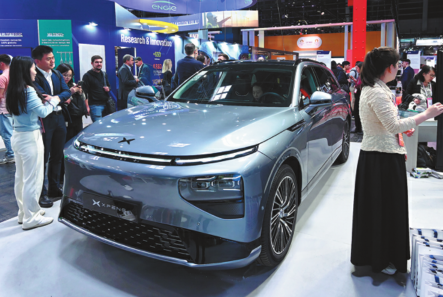Musk says he opposes tariffs on Chinese EVs

PARIS — Tesla founder Elon Musk told tech investors in Paris on Thursday that he opposed US tariffs on Chinese electric vehicles and that he did not favor measures that distorted the market.
This month, US President Joe Biden rolled out new tariffs on an array of Chinese imports, including EVs, seeking to support manufacturing in the United States.
"Neither Tesla nor I asked for these tariffs. In fact, I was surprised when they were announced. Things that inhibit freedom of exchange or distort the market are not good," Musk told the Viva Technology conference in Paris via video link.
"Tesla competes quite well in the market in China with no tariffs and no deferential support. I'm in favor of no tariffs."
The Biden administration has maintained a number of tariffs introduced by former president Donald Trump, while ratcheting up others, including quadrupling EV duties to more than 100 percent. The White House said the new measures affect $18 billion in imported Chinese goods.
The US' new protectionist stance in international trade will only raise prices, limit consumer choices and risk growth, said an opinion piece carried by The New York Times on Tuesday.
The US tariffs on Chinese electric vehicles and other products are mainly aimed at pleasing voters rather than economic considerations, wrote Steven Rattner, who served as counselor to the US treasury secretary in the Barack Obama administration.
With people in the US unsatisfied with the state of the economy, Rattner said "eyes often turn to the growing number of inexpensive imports, particularly from China", in search of scapegoats.
Tariffs raise prices and lead to more unemployment rather than less, he said.
From the start of 2018 to the start of 2020, prices of tariff-targeted goods rose by about 4 percent and the prices of non-targeted goods fell 1 percent, wrote Rattner citing Goldman Sachs analysis.
"Numerous studies have found that those higher prices were borne almost entirely by American companies and consumers — not by Chinese exporters," he said, adding that a Tax Foundation analysis showed Trump tariffs cost 166,000 jobs in the US.
Reviewing the history of trade protectionism in the United States, Rattner found that the tariffs, pitched as a means of protecting workers and farmers during a downturn, have often triggered a global wave of protectionism that exacerbated depressions and crippled global trade.
On the contrary, trade liberalization which sharply reduced tariffs, Rattner wrote, has "brought consumers in the United States and elsewhere less expensive and often superior goods, helping fuel strong economic growth and moderate inflation".
Agencies - Xinhua

Today's Top News
- China's top legislature concludes standing committee session
- Thailand and Cambodia agree to temporary ceasefire
- NPC's 4th annual session slated for early March
- Civilizational links for a fairer world
- Manufacturing in China spurs global growth
- Taiwan lawmakers vote to pass motion to impeach Lai






























